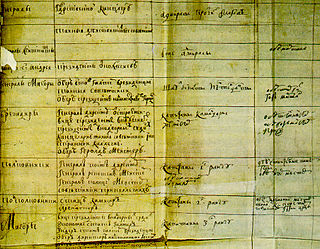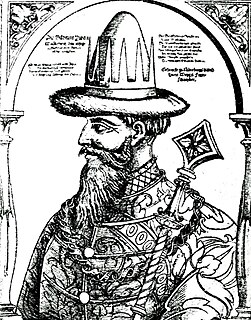
The Table of Ranks was a formal list of positions and ranks in the military, government, and court of Imperial Russia. Peter the Great introduced the system in 1722 while engaged in a struggle with the existing hereditary nobility, or boyars. The Table of Ranks was formally abolished on 11 November 1917 by the newly established Bolshevik government.

Modern Russian military ranks trace their roots to Table of Ranks established by Peter the Great. Most of the rank names were borrowed from existing German/Prussian, French, English, Dutch, and Polish ranks upon the formation of Russian regular army in the late 17th century.

The Brockhaus and Efron Encyclopaedic Dictionary is a comprehensive multi-volume encyclopaedia in Russian. It contains 121,240 articles, 7,800 images, and 235 maps. It was published in Imperial Russia in 1890–1907, as a joint venture of Leipzig and St Petersburg publishers. The articles were written by the prominent Russian scholars of the period, such as Dmitri Mendeleev and Vladimir Solovyov. Reprints have appeared following the dissolution of the Soviet Union.

Junker (Russian: юнкер, has several meanings in Imperial Russia. The Russian substantive Yunker is derived from the German noun Junker, where it means "young lord".
Podpolkovnik is a military rank in Slavic and nearby countries which corresponds to the lieutenant colonel in the English-speaking states and military.

Stepan Fyodorovich Alexandrovsky (Russian: Степан Фёдорович Александровский; was a Russian portrait painter and watercolorist.
In the Russian Empire, government agencies exerted varying levels of control over the content and dissemination of books, periodicals, music, theatrical productions, works of art, and motion pictures. The agency in charge of censorship in the Russian Empire changed over time. In the early eighteenth century, the Russian emperor had direct control, but by the end of the eighteenth century, censorship was delegated to the Synod, the Senate, and the Academy of Sciences. Beginning in the nineteenth century, it fell under the charge of the Ministry of Education and finally the Ministry of Internal Affairs.

Alexei Ivanovich Belsky was a Russian painter. He was part of the "Belsky Dynasty" of painters of the Eighteenth Century and a teacher at the Imperial Academy of Arts. He specialized in landscapes, allegories and historical subjects.

The Granat Encyclopedic Dictionary is a Russian encyclopedic dictionary originally published in 58 volumes with one supplement throughout both the Tsarist and Soviet periods. The dictionary's full title is The Encyclopedic Dictionary of the Granat Russian Bibliographical Institute. The word "Granat" refers to the last name of two brothers, Alexander and Ignatiy Granat, who commissioned the articles in their Moscow office.

Pyotr Nikolayevich Petrov was a Russian writer, arts historian and critic, genealogist, bibliographer, an honourable member of the Imperial Academy of Arts and a member of the Russian Archeological Society.

Aleksandr Ivanovich Yatsimirsky was a Russian philologist-slavistic and a specialist in history of Romania and Moldavia. He was one of the authors of the Brockhaus and Efron Encyclopedic Dictionary.
The Military Governor was the highest government and military official in a Governorate or Oblast, who was also the commander of troops in his area in the Russian Empire until 1917.

Aleksandr Aleksandrovich Bibikov was an officer of the Imperial Russian Army, who saw service during the Russo-Swedish War and the Napoleonic Wars. He was ambassador to several countries, and also served as a senator in the Governing Senate.
The second major was the junior staff officer rank in the Imperial Russian Army of the Russian Armed Forces of the imperial period of time, in the 18th century, and also the person wearing this rank.

Zemshchina was in the classical sense, according to the definition of the archaeographer Vasily Storozhev, "land, as a concept opposite to the state, to everything state and sovereign in ancient Russia".
Posad People were a class of medieval (feudal) Russia, whose duties were to bear the tax, that is, pay monetary and natural taxes, as well as perform numerous duties.

The hussar regiment was a formation of the light cavalry of the Army of the Russian Kingdom and the Russian Imperial Army of the Armed Forces of the Kingdom and the Empire.
Oberjägermeister is a courtier Class II rank in the Table of Ranks of the Russia. Ober-Jägermeister belonged to the highest ranks of the Imperial Court.












